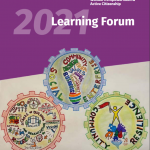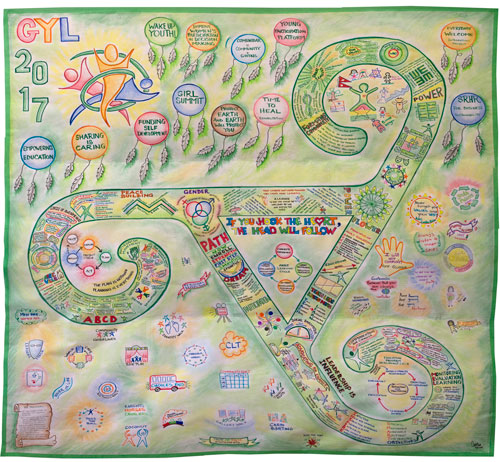The Coady International Institute’s Innovation series, launched in 2015, showcases the work of Coady faculty, associates, and partners. Acting as a bridge between academic and practitioner worlds, the Coady Institute contributes new ideas, new ways of putting ideas into practice and innovative ways of creating transformative experiences in our educational programs.
New! Engage! 2021 Learning Forum
Coady Institute, February 2022.
ENGAGE! Women’s Empowerment and Active Citizenship is a five-year initiative co-designed by Coady Institute and five partner organizations in Bangladesh, Ethiopia, Haiti, India, and Tanzania.
All six organizations recently designed and facilitated a Learning Forum on topics such as: Feminism in practice, establishing social enterprise in non-profit organizations, community practices for resilience building, and more.
Innovative Thinking
These papers describe research that explores development trends and citizen strategies for bringing about successful change.
Applying social network analysis to Coady networks: The case of South Africa
Eric Smith, December 2018.
This paper presents Coady’s test of Social Network Analysis to map alumni networks in South Africa. This paper provides a brief overview of Coady’s approach and work in South Africa, an introduction to Social Network Analysis as a methodology, and initial findings from the study and recommendations for supporting graduate networks. While similar to the asset-based community development (ABCD) tool of asset-mapping, Social Network Analysis provides a new set of analytical tools and approaches for mapping relationships.

Assets on the right(s) track? Reflections at the intersection of human rights-based approaches and asset-based and citizen-led development
Julien Landry & Brianne Peters, December 2018.
Asset-based and citizen-led development (ABCD) and human rights-based approaches (HRBAs) are at the centre of Coady’s educational programs and partnerships. However, there has been little investigation into how these approaches can align and better integrate to make more meaningful, systemic change, and ultimately enable communities to become “masters of their own destiny” (Coady, 1939). This Innovation in thinking builds on an earlier discussion paper – Human Rights Based Approaches and Citizen-Led, Asset-Based and Community-Driven Development – and is largely informed by a series of participatory workshops with Coady staff members, as well as human rights and ABCD practitioners and scholars from around the world. It is a first step in articulating what connects these approaches and offers a discussion of critiques, outstanding questions, and areas for further research.

Can participation ‘fix’ inequality? Unpacking the relationship between the economic and political citizenship
John Gaventa, April, 2016.
This paper, based on a lecture given at the University of Sussex, UK, takes on the issue of growing inequality. Arguing that we know more about how economic inequality affects political participation than we do about how participation and voice affect economic inequality, Gaventa describes ongoing work to identify participatory practices that offer some precedents for linking strategies for narrowing political and economic gaps from below. These combinations contribute to challenging these intersecting inequalities and hold promise for transformative solutions across the global North and South.

Feminist economics in practice: Inclusive gender responsive budgeting: tools and techniques for finance and non-finance community leaders
Naima Imam Chowdhury, December 2018.
This report provides a background defining the issues and concepts of gender budgeting. The second half of the report focuses on the steps undertaken to develop an inclusive gender responsive budget.

Innovation, investments, incentives and impact: What can rural women in Ghana teach us about social enterprise?
Yogesh Ghore, David Fletcher, with Fati Abdulai, December 2018.
This paper looks specifically at baobab as indigenous food for the local community as well its economic potential for providing additional income to women who are the primary collectors of this non-timber forest resource. The paper highlights the case of a social enterprise in the Upper East Region (UER) being developed by the Women and Orphans Movement (WOM) based on strengthening a producer-led value chain for baobab products for domestic as well as export markets.
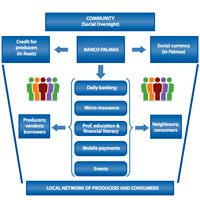
Pathways toward political and economic agency: A synthesis of findings from five scoping studies
Alison Mathie, Eileen Alma, Nanci Lee, Brianne Peters and Bettina von Lieres, January, 2017.
In this paper, we explore the links between economic inequality and political participation and why we think a broad understanding of citizenship can help us analyze these links more fully.

Resource centres promoting information access, activism and people’s knowledge
Catherine Irving, December 2018.
This paper reports on the results of a research study examining the evolving role of libraries and resource centres supporting community development and civic participation—both the challenges faced, and the opportunities for re-engagement. Analysis of current literature is interwoven with the insights of development practitioners attending Coady programs. The study is structured on three themes: Information literacy, documenting people’s knowledge, and library space.

Using producer-led value chain research to revitalize indigenous foods and launch social enterprises: Lessons from Ghana
David Fletcher, Yogesh Ghore, with Bernard Y. Guri, Daniel Banuoku, and Elham Mumuni, December 2018.
From 2014 to 2018, the Centre for Indigenous Knowledge and Organizational Development (CIKOD), the Rural Women Farmers Association of Ghana (RUWFAG), and the Coady Institute collaborated on an action research initiative to learn how producer-led value chain analysis could support the revitalization of indigenous food, specifically, groundnuts.
This initiative demonstrated how endogenous food sovereignty approaches can be complemented by economic value chain analysis, and how market linkages can benefit women groundnut producers. It also demonstrated that entering the market as a woman entrepreneur or as an NGO-led social enterprise has numerous challenges and demands beyond capacity-building and investment.
Innovative Practice
These papers include tested tools and approaches to support community development practitioners in their work.
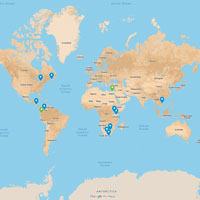
ABCD Google Map: Building Assets and Agency: Lessons learned from around the world
Brianne Peters, January 2019.
From October 22-December 9, 2018, the Coady Institute hosted its first Asset-Based and Citizen-Led Development online course with 19 Coady graduates and associates from 14 countries from around the world. The course, entitled “Building Assets and Agency: Lessons Learned from Around the World” included seven modules exploring ABCD principles; the context of our work; ABCD in communities; organizations; within our individual lives; critiques; and final reflections. The map introduces you to the participants and the stories behind their work. If you would like to add your stories to the map, please email bpeters@stfx.ca.
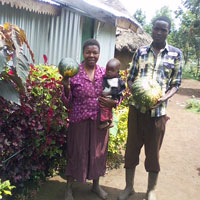
Bridging the divide in community development
Lisa Elena Fuchs, December 2018.
After the completion of a four-year asset-based community-development (ABCD) climate change adaptation and mitigation pilot (2010–2014), and more than three years into the four-year (2015–2019) proof of concept phase, this innovation documents and explores sixteen key lessons about the importance of process. These lessons focus on how external actors can support community-driven scaling of land-based development activities that are both context-specific and responsive to local identities, interests, and preferences.

Exploring an asset-based and citizen-led approach to enhancing the adaptive capacity of farmers to climate change
(partner website)
Coady graduates from the World Agroforestry Centre (ICRAF) in Kenya have combined an asset-based approach with the promotion of agroforestry and agricultural best practices in order to enhance the adaptive capacity of farmers to climate change. The project, ‘Accelerating the Adoption of Agroforestry’ (Triple A), is explored using photographs, videos, and reflections on this customized website. The ‘Humans of Triple A’ photo series, specifically, illustrates the underlying approach of the project: being appreciative, listening, and supporting self-driven initiatives, creating linkages between households and communities and other potential partners, supporting the development of business skills, and providing reliable backstopping opportunities.

Identities, interests and preferences matter. Fostering sustainable community development by building assets and agency in western Kenya
Lisa Elena Fuchs, Brianne Peters, Henry Neufeldt. Published by Sustainable Development, March 2019. (StFX access)
The World Agroforestry Centre (ICRAF), in collaboration with the Coady Institute, has integrated an asset-based approach to a project entitled ‘Accelerating the Adoption of Agroforestry’ (Triple A). This paper explores how action research during the initial ‘pilot phase’ of the project (2010-2014) provided the reflection time necessary for project implementers to improve their approach in the ‘proof of concept’ phase (2015-2019), which was scaled to 600 households. The paper outlines the overall process, precise steps, and important features of the approach, and specifically focuses on how external actors can be fair and useful partners to communities interested in driving their own development: by contributing to building self-awareness, skills and confidence; proposing to be ‘equal’ partners who adapt their offer in terms of trainings, skills and knowledge to self-formulated interests; and proposing sustainability-focused modules into the trainings, including community finance mobilization, farmer-to-farmer outreach, and a backstopping office that allows project staff to provide demand-driven support.

The integrated household leaky bucket
Gord Cunningham, Lisa Elena Fuchs, Victoria Atieno Apondi, Kipkorir, Langat Cosmas, and Levi Alfred Orero Owiti, December 2018.
A companion guide to Producer-led Value Chain Analysis: the missing link in value chain development.
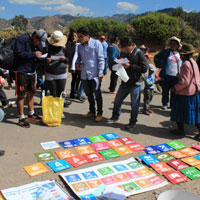
Participatory, accountable, and inclusive governance in practice: A collection of Participedia case studies by Coady graduates
Edited by Julien Landry, October 2018.
This compilation highlights 12 case studies of democratic innovation and participatory governance processes documented by Coady graduates.
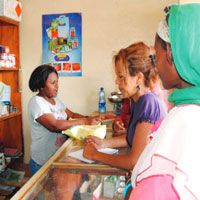
Producer-led value chain analysis: The missing link in value chain development – a tool for effective engagement of small producers
Yogesh Ghore, March 2015.
This publication introduces value chains, which are increasingly being used to design and implement development programs for reducing poverty. It helps you analyze the key activities, relationships, and mechanisms that allow producers, processors, buyers, sellers, and consumers to gradually add value to products and services as they pass from one link of the chain to another.
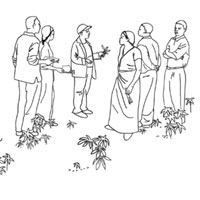
Producer led value chain analysis: Facilitator’s guide
Yogesh Ghore, 2018 revision.
This guide shows field level facilitators and producers how to do their own value chain analysis. It is meant to complement, not replace, other methods of studying value chains. This process allows producers to generate information that will help them design their own action plans to improve their position in a value chain.

Re-blocking and resilience in Canumay East, Manila
Corrine Cash, Skye Dobson, Ma Theresa Carampatana, November 2018
Video case study, produced by Homeless People’s Federation of the Philippines, SDI (Slum/Shack Dwellers International), and Coady International Institute.
Innovative Teaching
This page includes publications about innovative approaches to education and learning that have been tested for classroom or workshop use.
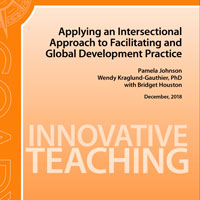
Applying an intersectional approach to facilitating and global development practice
Pam Johnson, Wendy Kraglund-Gauthier and Bridget Houston, December 2018.
The authors share insights on strengthening diversity and inclusion in curriculum development.

From study clubs to co-operative inquiries: Social learning at Coady International Institute.
Olga Gladkikh, November 2015.
This publication reflects on the rich experience gathered over the past decade of using a co-operative inquiry methodology at Coady Institute. It describes the evolution of the adult learning process and identifies some of the key learnings drawn from participants and Coady staff. It is designed primarily for adult educators, especially those working in university contexts.
Supporting Youth Leadership for Change
Adam Baden-Clay, 2018
This (continually evolving) resource is intended to serve two primary purposes:
- To inform potential Coady youth participants and partners about the work we do, and
- to provide information that may prove helpful to others who are also working to support youth leadership for social change.
The first phase of development will primarily consist of populating the site with the information, methods and practices currently used in Coady youth leadership programming. Subsequent phases will use these details to attempt to create a holistic framework that can be utilized by those supporting youth leadership for change to optimize their work.

